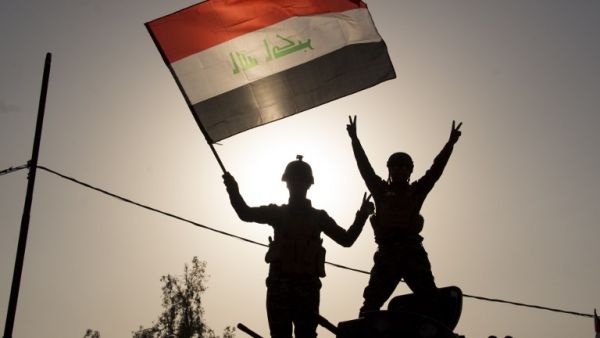Three years after Daesh took over swathes of the north, yesterday Iraq emphatically celebrated its “defeat”.
On Sunday afternoon Iraqi Prime Minister Haider al-Abadi arrived in Mosul to “congratulate the heroes and the Iraqi people on achieving the great victory.”
القائد العام للقوات المسلحة الدكتور حيدر العبادي يصل مدينة الموصل المحررة ، ويبارك للمقاتلين الابطال والشعب العراقي بتحقيق النصر الكبير
— Haider Al-Abadi (@HaiderAlAbadi) July 9, 2017
By Sunday evening, commanders were reporting that only 200 ISIS fighters remained in the Old City, as total victory over Iraq’s second city seemed secure.
Still, Abadi said he would not make a victory speech until the last Daesh-held pocket of Mosul was liberated.
Washington Post reporter Louisa Loveluck tweeted the following.
Looks like Abadi won't give Mosul victory speech until this final pocket cleared. Commander said it was 200x50m. Iraqi forces edging thru. pic.twitter.com/3vIYeGqnn3
— Louisa Loveluck (@leloveluck) July 9, 2017
That did not stop Iraqis taking to the streets in droves across the country to celebrate the “defeat of Daesh”.
Mosul
#شاهد| جانب من احتفالات شباب أهل #الموصل في الجانب الأيسر من المدينة، ما لا يريدك إعلام #داعش أن تراه. pic.twitter.com/AsD7XGEbas
— عبدالله حمودا (@Hammodat1) July 10, 2017
Baghdad
Ramadi
The city was recaptured from Daesh in December 2015, seven months after it was taken by the militants.
Fallujah
Like Ramadi, Fallujah is located in al-Anbar province, and was held by Daesh. The extremist fighters were defeated here in June 2016. Some online pointed out that yesterday's celebrations in the city seemed to be predominantly led by government security forces.
Najaf
However enthusiastic the celebrations, this “victory” is one tainted by the acute suffering and destruction Daesh has left in its wake.
The UN estimated that 150,000 civilians were trapped in harrowing conditions in Mosul’s Old City as the army and allied militias made their final offensive to push out Daesh last month.
UN humanitarian coordinator: "Levels of trauma we are seeing are some of highest anywhere. What people experienced nearly unimaginable."
— Louisa Loveluck (@leloveluck) July 10, 2017
"اليوم ... ولِدنا من جديد"
— مجاهد الطائي (@mujahed_altaee) July 9, 2017
"ما حصل لا يمكن وصفه"
جوع دمار خوف عطش
هذه بعض كلمات قالها هذا الشيخ الذي خرج من #الموصل القديمة حديثاً. pic.twitter.com/QThB9hrvBi
Today we were born again. What has happened is indescribable. Hunger, destruction, fear and thirst. These are some of the words of this old man who just escaped the Old City of Mosul.
Reporter Francesca Mannocchi tweeted this.
An elderly woman rescued yesterday in Mosul: "in the last few days we were drinking pee - she said pic.twitter.com/lycUEMaNOu
— francesca mannocchi (@mannocchia) July 10, 2017
Meanwhile, nearby refugee camps are pushed to breaking point as they host hundreds of thousands who fled the city during fighting over the last nine months.
UN: 920,000 Mosul civilians have fled their homes, almost 700,000 still displaced - nearly half living between 19 emergency camps.
— Louisa Loveluck (@leloveluck) July 10, 2017
Hundreds of Iraqi soldiers have lost their lives in the fight for Mosul, including many from Iraq’s elite Counter-terrorism Service (CTS), which was responsible for much of the operation to retake the city which began last October.
According to American officers, the toll had reached 774 by March and is likely to be more than a thousand now, the New York Times reported.
40 percent CTS battle losses as a whole, not just KIA. Still a very heavy toll. Some units even higher. https://t.co/wAqYkHWbkE
— Patrick Osgood (@PatrickOsgood) July 9, 2017
That is not to mention the thousands of civilians killed, reportedly including hundreds as a result of US airstrikes.
Meanwhile, much of Mosul has been left in ruins. The UN has suggested that of the 54 neighborhoods in western Mosul, 15 neighborhoods are heavily damaged, including as many as 32,000 houses.
West #Mosul, a stretch of rubble. pic.twitter.com/0hDQ0SfFVj
— francesca mannocchi (@mannocchia) July 10, 2017
On top of all of that, it should also be remembered that this is not the complete defeat of Daesh, nor even the defeat of Daesh in Iraq.
The extremist group maintains control over a number of towns and villages in northern Iraq.
Additionally, experts are suggesting that wiping out its stronghold in Mosul will only lead to a change of tactics, which may well see an increase in bomb attacks in Baghdad and other urban centers.
"Defeating #Isis doesn't mean defeating the deep reasons that created it" says a soldier in the frontline, yesterday. #Mosul
— francesca mannocchi (@mannocchia) July 10, 2017
Still, yesterday was a very proud day for many Iraqis, who saw their forces - quickly defeated by Daesh in 2014 - retake Mosul and claim "victory" over the extremists within three years, albeit with US support.
As PM Abadi said Sunday evening, "the world did not expect us to defeat Daesh that quickly."







